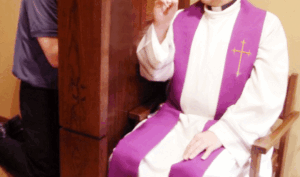Penance/Reconciliation
The Sacrament of Penance
also known as “Confession” or “Reconciliation”
Matthew 9:3-8 “And behold some of the scribes said within themselves: He blasphemeth. And Jesus seeing their thoughts, said: Why do you think evil in your hearts? Whether is easier, to say, Thy sins are forgiven thee: or to say, Arise, and walk? But that you may know that the Son of man hath power on earth to forgive sins, (then said he to the man sick of palsy,) Arise, take up thy bed, and go into thy house. And he arose, and went into his house. And the multitude seeing it, feared, and glorified God that gave such power to men.”
John 20:19-23 “Now when it was late that same day, the first of the week, and the doors were shut, where the disciples were gathered together, for fear of the Jews, Jesus came and stood in the midst, and said to them: Peace be to you. And when he had said this, he showed them his hands and his side. The disciples therefore were glad, when they saw the Lord. He said therefore to them again: Peace be to you. As the Father hath sent me, I also send you. When he had said this, he breathed on them; and he said to them: Receive ye the Holy Ghost. Whose sins you shall forgive, they are forgiven them; and whose sins you shall retain, they are retained.”
St. Bernard -“The tears of the penitents are wine for the angels.”
The Catechism of the Catholic Church defines sin as “an offense against reason, truth, and right conscience; it is failure in genuine love for God and neighbor caused by a perverse attachment to certain goods.”
Penance is a sacrament began by Jesus in which sins are forgiven. All the sins committed after baptism are granted through the priest’s absolution to those who confess their sins and are willing to satisfy for the same. This is called a sacrament because it is a sign instituted by Jesus Christ to bring grace to the soul. “If we confess our sins, he (Jesus) is faithful and just, and will forgive our sins and cleanse us from all unrighteousness” (1 John 1:9).
Minor or venial sins can be confessed directly to God, but for grave or mortal sins, which break our relationship with God and deprive in us grace there set up a sacrament of confession.
Confession is enlightening and healing. Confessing helps us to examine how selfish we are, how well we are using our gifts and talents. It can also bring up some concerns about our relationship with Jesus Christ. We should remember we are not alone in the confessional; the Holy Spirit is at work as well.
The steps to Confession are:
1. Examination of Conscience – to consider your Duties to God, Church, family, society and to yourself to see where you’ve failed to honor them.
2. Contrition – Contrition is willful regret for one’s sins. It isn’t a matter of one’s “feelings” of guilt, but of conviction of the evil of sin, and the resolution to sin no more. In other words, contrition is rooted in the will, not in the emotions.
3. The actual confessing of your sins to God through His priests – When you are ready to begin, make the Sign of the Cross and say; Bless me, Father, for I have sinned. It is (X days, weeks, months, years) since my last Confession. I accuse myself of the following sins; name the sins you need to confess. When you are finished, you can say: For these and all the sins of my past life, I ask pardon of God, penance, and absolution.
4. The assigning of penance – to help you pay for the temporal and eternal effects of your sins. Priest might ask you to say certain prayers, or to read certain parts of the Scripture.
5. Act of Contrition – to express your sorrow at having offended God and resolving to sin no more; O my God, I am heartily sorry for having offended Thee and I detest all my sins because of Thy just punishments, but most of all because they offend Thee, my God, who are all good and deserving of all my love. I firmly resolve, with the help of Thy grace, to sin no more and avoid the near occasions of sin. Amen.
6. Absolution- Christ, through His priest, grants you absolution.
7. Carrying out your penance – As soon as possible, carry out the penance you were given. Do all you can to avoid near occasions of sin, to bear patiently the temporal effects of the sins you’ve committed, to make restitution to anyone you’ve harmed.
One other way the grace of the Sacrament of Penance may be received; Perfect contrition absolves sin in itself. For example, if a person is sorry for his sins but is trapped on a desert island without a priest.
We are bound by the Sacraments; God is not, and has many ways of pouring out His grace to us!
Perfect contrition, though, includes the desire to obey God and not offend Him further, but God wants us to confess our sins to a priest. Therefore, if the person can, he must go to Confession if there is a mortal sin to confess, or at least once a year. If the person is unable to confess in the normal way, but would confess in the normal way if it were possible, then merciful God provides.
“General Absolution” as is given in “communal penance services” in which a priest “absolves” an entire group of their sins. It is illicit unless it is a serious emergency (you’re all on the Titanic, you’re a group of soldiers getting ready to go into battle, etc.) If you are in a group that receives such “absolution,” you are still required to go to individual Confession if it is at all possible.

